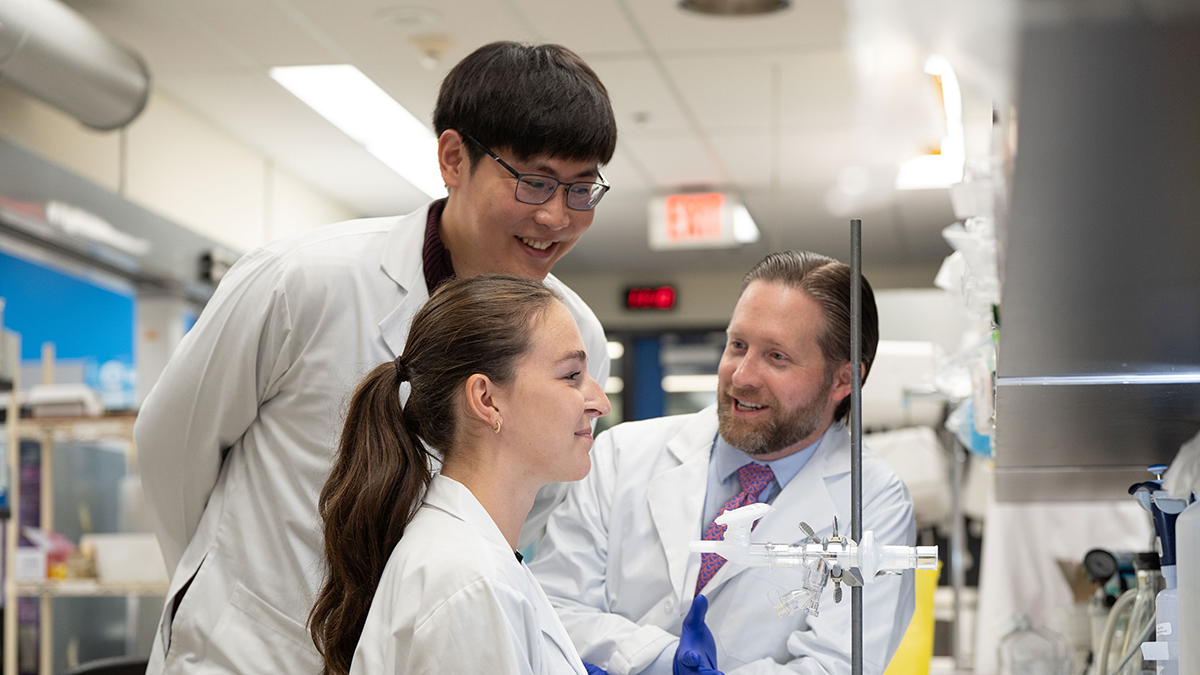Markian Pahuta named inaugural W. H. Kwok Chair in Spine Surgery Research

Markian Pahuta has been appointed the inaugural W. H. Kwok Chair in Spine Surgery Research, effective July 1, 2024. Pahuta is an assistant professor in the Division of Orthopedic Surgery in the Department of Surgery, with associate membership in the Department of Health Research Methods, Evidence, and Impact.
As chairholder, Pahuta will strive to push the spine surgery specialty forward through advancing important scholarly research, with the specific focus of benefitting current patients.
This new chair is possible thanks to a generous gift from Desmond Kwok, a McMaster professor in the orthopedic surgery and neurosurgery residency programs. The chair is named in honour of Kwok’s mother, Wai Hing So Kwok, who died in 2017 at the age of 93.
“I am honoured and grateful to receive the W. H. Kwok Chair in Spine Surgery Research. It is especially meaningful that it is made possible by a McMaster professor in tribute to his late mother” says Pahuta. “This chair will help expand research focusing on decision supports for patients and their healthcare providers regarding treatments for spinal disorders. Furthermore, this chair highlights spine surgery as a distinct surgical discipline and bolsters efforts for development of academic spine surgery at McMaster.”
After receiving his MD in 2008 at the University of Toronto, Pahuta completed his orthopedic surgery residency in 2015 at the University of Ottawa, and a clinical fellowship in spine surgery in 2016 at the University of Toronto. From 2016 to 2020, he was a staff spine surgeon at the Henry Ford Health System in Detroit with the Departments of Orthopaedic and Neurological Surgery. He completed a PhD in Epidemiology from the University of Ottawa in 2019, and joined the Department of Surgery at McMaster in 2020.
“I want to congratulate Dr. Pahuta on his appointment as the W. H. Kwok Chair in Spine Surgery Research,” says Paul O’Byrne, dean and vice-president of the Faculty of Health Sciences at McMaster University. “Dr. Pahuta’s extensive research, education and clinical experience well position him for this appointment.”
Pahuta specializes in complex reconstructive spine surgery. and holds a number of clinical and academic leadership roles, including spine sarcoma champion for the Juravinski Cancer Centre’s provincial sarcoma program and spine surgeon lead for the Hamilton Health Sciences Tumour Board. He also served as deputy head of service for spine surgery in 2023. He is actively involved in surgical education at McMaster and served as the co-director of the McMaster Combined Neurosurgical and Orthopaedic Spine Surgery Fellowship from 2020-2024.
“Dr. Pahuta brings both research expertise and commitment to the vision of W. H. Kwok Chair in Spine Surgery Research. The Department of Surgery will work closely with him in his pursuit to transform spine research to optimize the care of patients, locally and world-wide,” says Mohit Bhandari, chair of the Department of Surgery at McMaster.
Pahuta is actively involved in spine surgery education, demonstrates a sustained record of involvement in scholarly clinical activity, and excels in the areas of knowledge translation and dissemination within the greater orthopaedic neurosurgical and spine communities. His work has formed the basis of many presentations at scientific meetings on a national and international level.
Additionally, Pahuta is an associate editorial board member for The Spine Journal, advocacy chair for the Canadian Spine Society. Pahuta is actively involved in global health efforts and sits on the SIGN Spine Core Group which is developing the field of spine surgery at institutions in East Africa. He also founded the Advanced Surgical Skills and ImplantS for Trauma (ASSIST) program at the Department of Surgery to provide educational support for surgeons in low-resource and conflict settings.
ResearchRelated News
News Listing

McMaster researchers get federal funding to study emerging bird flu threat
Dept. Biochem, Research
2 days ago

Brighter World ➚
Analysis: Why can’t we die at home? Expanding home care could reduce the financial and environmental cost of dying in hospital
Research
2 days ago

McMaster-affiliated non-profit gifts $300,000 to Global Nexus to support pandemic research
Collaborations & Partnerships, Research
7 days ago
